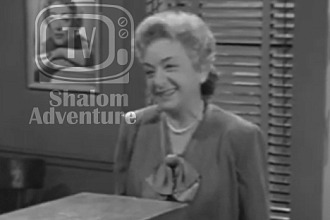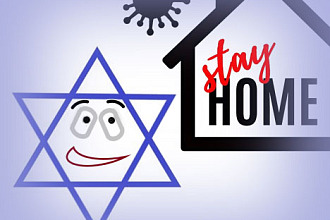"More than nine-in-ten Jews (94 percent) agree they are 'proud to be Jewish. Three-quarters (75 percent) say they have a strong sense of belonging to the Jewish people, and about six-in-ten (63 percent) say they have a special responsibility to care for Jews in need around the world."
Pew Research
Jewish identity in America is changing as the number of non-religious Jews continues to rise, a new study has found, and the increasing number of Jews marrying outside the faith could be a factor.
The survey of nearly 3,500 adults conducted earlier this year found that many Jews said being Jewish is more about ancestry and culture than about religion, according to the Pew Research Center's study "A Portrait of Jewish Americans," released Tuesday.
Even among those who identified as Jewish by religion, more than half (55 percent) said their identity was more a matter of their ancestry and culture, while 17 percent said it was their religion, 26 percent said it was a combination of all three traits. In that same group, 66 percent said atheism is compatible with being Jewish and 30 percent said believing Jesus is the Messiah wouldn't disqualify someone from being Jewish.
"By and large, it's hard to be drummed out of the tribe," said Alan Cooperman, deputy director of Pew's Religion & Public Life Project.
The report marks the first time since the 1957 Census that a group outside the Jewish community has conducted a survey specifically of Jews in America. Based on census findings and those by Pew, those who identified as Jewish by religion has dropped by about half, from 3.2 percent in 1957 to 1.8 in 2013, according to the Pew study.
Cooperman explained that examining Jews in America was unique compared to other religious studies because researchers had to come up with a definition of who is Jewish and who is not.
"We decided to cast a very wide net," he said, that went beyond asking if a person is Jewish by religion. Those who were not Jewish by religion but who had a Jewish parent or were raised Jewish and still considered themselves Jewish were also included in the survey.
Researchers interviewed but did not include in the main survey results those who had Jewish heritage but were affiliated with another religion or didn't consider themselves Jewish and those who were not Jewish but had an affinity for Jews or considered themselves Jewish in some way.
Family matters
As the number of Jews who identify by religion has dropped, the number of the Jews who identify as nonreligious appears to have been growing, researchers say. More than one-fifth (22 percent) of Jews included in the main results said they had no religion. The cohort with the most nonreligious Jews is millennials (32 percent), while the proportion of nonreligious Jews decreases with older generations.
While the number of unaffiliated Jews reflects larger trends in the general U.S. population of people distancing themselves from organized religion, one factor in that shift may be unique among Jews — marrying outside of the faith.
Intermarriage is more common among secular Jews than among religious Jews, according to the survey. Nearly eight in 10 Jews of no religion who are married (79 percent) have a spouse who is not Jewish, compared with 36 percent among Jews who identify by religion. The rate of intermarriage has increased substantially over time. Among Jews who married before 1970, 17 percent have a non-Jewish spouse. Among those who married between 2005 and 2013, the figure is 58 percent, the Pew study stated.
The Pew report stresses that its research draws no causal connection between intermarriage and the rise in the number of non-religious Jews. However, the study found strong associations between secular Jews and intermarriage, particularly when it comes to raising children. Just 20 percent of intermarried Jews are raising their children Jewish by religion, compared with 96 percent of Jews who have a Jewish spouse. (Another 25 percent of intermarried Jews say they are raising their children partly Jewish by religion, as do 2 percent of Jews who have a Jewish spouse.)
"Furthermore, Jews who are the offspring of intermarriages appear, themselves, to be more likely to intermarry than Jews with two Jewish parents," the survey stated.
Bruce Phillips, a professor at Hebrew Union College in Los Angeles, has studied intermarriage among Jews and found that most Jews who identify as having no religion were raised in intermarriages.
A decade ago, Phillips found 60 percent of children in interfaith marriages were raised in the Jewish religion and he speculates that's down to 50 percent today.
"More of them were raised as Christians and identified as Christians," said Bruce Phillips, a professor at Hebrew Union College in Los Angeles.
He explained that among the factors at play among those raised in intermarried homes and now claiming they are not religious is taking a secular path to avoid offending either parent.
"Either way, there will probably be fewer Jews by religion for another 20 years," he said.
The Jewish denomination suffering the least from this trend appears to be Reform Judaism, the largest denomination of Jews in the United States with 35 percent of those surveyed. The Pew study found 55 percent of Jews who were raised in the Reform movement have remained, while 36 percent raised as Conservative Jews are still among that group and more than half of those raised Orthodox are no longer part of that denomination.
"Those are encouraging signs for Reform Jews," said Rabbi David Saperstein, director of the Religious Action Center of Reform Judaism. "But the rate of intermarriage and (those who don't identify with religion) is a major challenge of all communities to maintain Jewish identity into the future."
Jewish identity
But whether religious or not, Jews of all stripes are proud of their identity, the Pew Research study found.
"More than nine-in-ten Jews (94 percent) agree they are 'proud to be Jewish,' the study stated. "Three-quarters (75 percent) say they have a strong sense of belonging to the Jewish people, and about six-in-ten (63 percent) say they have a special responsibility to care for Jews in need around the world."
There is also general agreement on what it means to be Jewish. Exactly two-thirds of nonreligious Jews and 76 percent of Jews by religion said remembering the Holocaust was essential to being Jewish. Majorities in both groups also said leading an ethical and moral life was essential. And both groups believe having a sense of humor is more important than observing Jewish law or eating traditional Jewish foods as identifying charteristics of being Jewish.
The exception to these patterns is Orthodox Jews, 79 percent of whom say oberving Jewish law is essential to being Jewish compared with 39 percent who said a sense of humor is essential.
Originally found here


























